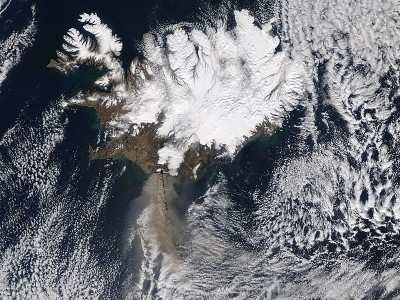Fri, Apr 23, 2010
IATA Urges Measures To Mitigate Impact
 The International Air Transport Association (IATA) estimated
that the Icelandic volcano crisis cost airlines more than $1.7
billion in lost revenue through Tuesday-six days after the initial
eruption. For a three-day period (17-19 April), when disruptions
were greatest, lost revenues reached $400 million per day.
The International Air Transport Association (IATA) estimated
that the Icelandic volcano crisis cost airlines more than $1.7
billion in lost revenue through Tuesday-six days after the initial
eruption. For a three-day period (17-19 April), when disruptions
were greatest, lost revenues reached $400 million per day.
"Lost revenues now total more than $1.7 billion for airlines
alone. At the worst, the crisis impacted 29% of global aviation and
affected 1.2 million passengers a day. The scale of the crisis
eclipsed 9/11 when US airspace was closed for three days," said
Giovanni Bisignani, IATA's Director General and CEO.
IATA noted there are some cost savings related to the flight
groundings. For example, the fuel bill is $110 million a day less
compared to normal. But airlines face added costs including from
passenger care. "For an industry that lost $9.4 billion last year
and was forecast to lose a further $2.8 billion in 2010, this
crisis is devastating. It is hitting hardest where the carriers are
in the most difficult financial situation. Europe's carriers were
already expected to lose $2.2 billion this year-the largest in the
industry," said Bisignani.
"As we are counting the costs of the crisis we must also look
for ways to mitigate the impact. Some of our airport partners are
setting industry best practice. London Heathrow and Dubai are
waiving parking fees and not charging for repositioning flights.
Others airports must follow," said Bisignani.
But Bisignani says the larger role is for governments.
He made three specific requests for regulatory relief:
- Relax Airport Slot Rules: IATA urged that rules on take-off and
landing slot allocation (use it or lose it) be relaxed to reflect
the extra-ordinary nature of the crisis.
- Lift Restrictions on Night Flights: IATA urged governments to
relax bans on night flights so carriers can take every opportunity
to get stranded passengers back home as soon as possible.
- Address Unfair Passenger Care Regulations: "This crisis is an
act of god-completely beyond the control of airlines. Insurers
certainly see it this way. But Europe's passenger rights
regulations take no consideration of this. These regulations
provide no relief for extraordinary situations and still hold
airlines responsible to pay for hotels, meals and telephones. The
regulations were never meant for such extra-ordinary situations. It
is urgent that the European Commission finds a way to ease this
unfair burden," said Bisignani.

Ash Cloud From Eyjafjallajokull Vocano Taken
4.17.2010
NASA Photo
Bisignani also urged governments to
examine ways for governments to compensate airlines for lost
revenues. Following 9/11, the US government provided $5 billion to
compensate airlines for the costs of grounding the fleet for three
days. The European Commission also allowed European states to
provide similar assistance.
"I am the first one to say that this industry does not want or
need bailouts. But this crisis is not the result of running our
business badly. It is an extra-ordinary situation exaggerated with
a poor decision-making process by national governments. The
airlines could not do business normally. Governments should help
carriers recover the cost of this disruption," said Bisignani.
More News
The Industry Continues to be Rocked By Some Questionable Operations Recent investigations and a great deal of data has resulted in ANN’s SportPlane Resource Guide’s rep>[...]
Make Sure You NEVER Miss A New Story From Aero-News Network Do you ever feel like you never see posts from a certain person or page on Facebook or Instagram? Here’s how you c>[...]
Visual Approach Slope Indicator (VASI) An airport lighting facility providing vertical visual approach slope guidance to aircraft during approach to landing by radiating a directio>[...]
Airport Marking Aids Markings used on runway and taxiway surfaces to identify a specific runway, a runway threshold, a centerline, a hold line, etc. A runway should be marked in ac>[...]
Aero Linx: The Skyhawk Association The Skyhawk Association is a non-profit organization founded by former Skyhawk Pilots which is open to anyone with an affinity for the A-4 Skyhaw>[...]
 Unfortunate... ANN/SportPlane Resource Guide Adds To Cautionary Advisories
Unfortunate... ANN/SportPlane Resource Guide Adds To Cautionary Advisories ANN FAQ: Turn On Post Notifications
ANN FAQ: Turn On Post Notifications ANN's Daily Aero-Term (04.29.24): Visual Approach Slope Indicator (VASI)
ANN's Daily Aero-Term (04.29.24): Visual Approach Slope Indicator (VASI) ANN's Daily Aero-Term (04.28.24): Airport Marking Aids
ANN's Daily Aero-Term (04.28.24): Airport Marking Aids ANN's Daily Aero-Linx (04.28.24)
ANN's Daily Aero-Linx (04.28.24)




